How many wins in the next two seasons does Hoke need to keep his job?
There seems to be a contrast of expectations that are somewhat contradictory, the aims of short-run success versus long-run program reputation
When it comes to a power program like Michigan, what evidence should be used to judge the job performance of coaches? There are the usual types of milestones and accomplishments thrown out (division titles, conference titles, BCS games). But I submit that by examining the make-up and changes in winning percentage is the main indicator in the way in which a coach should be judged. The ancillary rewards such as conference championships are rewards for wins and with a high enough winning percentages, those correlated accolades will accrue as the winning percentage increases.
The longer the sample, the less the impact of any one record from any given year would change the program success. On the other hand though, a large change from the program’s winning percentage prior the arrival of that coach to the five-years after his arrival would signal a “great coach” who could “bend the curve of a program’s trajectory”. I took the last six coaches for Michigan and looked at what the evidence shows in terms of success or failure.
If the last three years of the previous coach were poor records wise, then it is likely, the standard set of criteria for success would be, “Has this coach exceeded the results of the last coach?” For most programs, an affirmative answer to this question would result in the coach gaining the confidence of the fan/alumni base. But with Michigan (and other power programs), the next set of criteria would be, “Has the coach matched or exceeded the winning percentage of the program overall?”
When it comes to Brady Hoke, he has clearly met the first set of standards. Rich Rodriguez started from a nearly .700 winning percentage from Lloyd Carr’s tenure. He took this base and promptly shit the bed. By the empirical evidence of winning percentage, Rich Rodriguez is likely the worst coach in modern Michigan football history. The program was in better shape when Bo took over from Bump, so Hoke did not have a high bar to clear to clear the short-run collective memories of Rodriguez. In fact, Hoke’s increase in winning percentage of nearly 28 percentage points is second only to Bo, so he’s clearly a positive over Rodriguez.
The next, more macro set of standards is where the ennui with Hoke begins to set in. Examining the winning percentages on a season by season basis helps to simplify the overall trends and trajectory of a program with attempt to eliminate some of the randomness which can occur on a game to game and even season to season set of events which may limit the overall explanatory capability of the statistic. The power program and winning percentage are a gift and a curse. The gift is that the history helps with the overall great program sell and helps to perpetuate that this school has always been good therefore it will continue to be good mindset. The curse is that if the coach does not meet the historical standards set, he is considered a failure.
This presents a problem because a standard set over two different types of measurements is sure to create disappointment. In the case of Hoke, he has already met the short-run standards, which is a good thing. In his mind he can point to the crater which Rodriguez left and he has begun to fill it in and erect a new statue of success. But since this is a power program, Hoke’s success is relative. Hoke is currently less than the overall winning percentage of the program, .682 (depending on the results of the Copper Bowl) vs. about .735 (using stats from 1892 forward), this is better than the gap between the first few seasons of Bump and RichRod, but it falls short of Carr, Moeller and Bo. In fact, Hoke’s track record indicates that he is somewhat of a slow starter when it comes to his early coaching record versus the overall program’s record.
In contrast, Nick Saban, Urban Meyer and Les Miles have met or exceeded the program long-run average at nearly every stop they have been at (Saban at MSU has a similar profile to Hoke at M vis-à-vis program avg.)
The mark of a good coach is that they made their teams better. The mark of a great coach is that they made their programs better. Both Saban (LSU and Bama) and Meyer (FLA and Ohio) took decent to good programs and made them better. Miles also built upon a strong LSU program and did not regress even with the pace that Saban had set before him.
The other remarkable evidence in recent times are made up of four coaches at three power programs and one decent/good program. Pete Carroll, Jim Harbaugh, Bob Stoops and Mark Richt all set examples of blistering beginnings that M should push to emulate in the next two years.
Carroll and Stoops in particular took power programs and strengthened their long-run advantages.
Hoke’s numbers so far look more like Mack Brown and John Cooper, numbers which are underwhelming to say the least. Mack’s CEO style relies on maintaining the advantage of the program to pull in the best recruits. From Tulane to North Carolina and finally to Texas, Brown’s numbers are not earth-shattering, but they do offer a model for program consistency, if not extreme short-run success.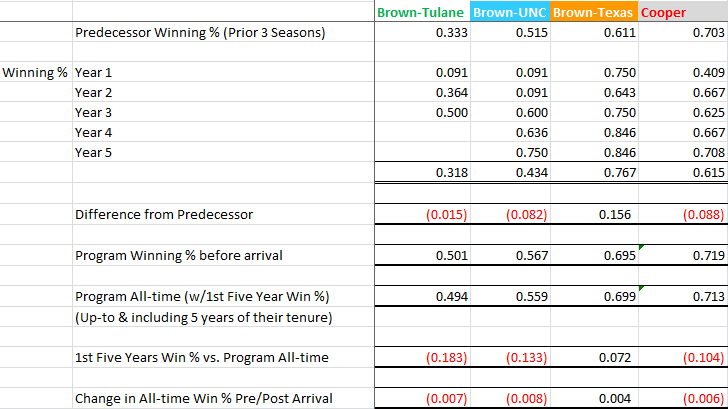
So, that leaves the questions which is the title to this diary, how many wins does Hoke need to keep his job (using the power program winning percentage as a central metric). Assuming that Hoke does win the Copper Bowl, to maintain the program's long-run success factor, Hoke must win 20 games in the next two seasons. This may sound unreachable sitting here today, but it could be 9 in 2014 and 11 in 2015, the distribution of the wins in a particular year does not matter, but Hoke needs those 20 wins to run his type of program.
This record assumes 10 wins evenly in both years. The power program strategy that Hoke is utilizing relies on the belief that that M is indeed a power thus attracting the recruits who want to be at said power. If that belief is lost, there could be a feedback loop whereas the loss of prestige eats away at the base which believes in that prestige and the entire program continues on this plateau of blah.
December 14th, 2013 at 9:04 PM ^
I am a K-State fan. Because I cannot start topics, I am forced to discuss navel gazing Michigan topics for a bit before I can blow your minds with my really awesome original posts.
" Heaven forbid we have a down season or two. Ignore whether Hoke and his staff develop young men, keep a clean program, are good for the school and graduate their players. It's all about how many wins this year or in two years.
What should we expect from our program? Teams that show character and in which we can take pride."
"Criticising coaches is fine, talking openly about forcing out a coach if they don't hit your personal W/L threshold is counterproductive."
Do these guys really think there is some giant magic karmic up/down vote Michigan bucket that is being tainted by someone, somewhere on the internet talking about multi-millionaire Brady Hoke's job performance? Good grief, the Big House isn't going to grow legs and terrorize Ann Arbor like in Ghostbusters. I hope all the young people that actually earned their way in to Michigan laugh at these class ring cheese dicks. You should demand results.
An old money attitude in a new money world will doom you to the faint praise of being "true Michigan men" and "playing it the right way" and being proud of a mediocre team in a mediocre Big Ten. If the achievements of Fielding Yost still keep you warm in 2013, more power to you.
gobluehtown, compiled some nice stats, but I wanted to look at 3 different questions:
1) conference record- are you competitive in the Big Ten?
2) conference titles- are you the best in the Big Ten?
3) BCS bowls- are you competitive among the nation's elite?
To provide some similar context I picked out 3 other blue blood programs that have had similar profiles over that span of time:
Michigan: Spilt National Title and on (1997-2013) 17 seasons
Nebraska: “ (1997-2013) 17 seasons
Texas: Mack Brown era (1998-2013) 16 seasons
Notre Dame: post-Lou Holtz (1997-2013) 17 seasons
Conference Record:
Texas 98-33
Michigan 92-44
Nebraska 90-46
Notre Dame N/A
Conference Championships:
Michigan 5 (Lloyd Carr 5)
Texas 2 (Mack Brown 2)
Nebraska 2 (Osborne 1, Solich 1)
Notre Dame N/A
BCS Bowls:
Michigan 3-3 (1 MNC) (Hoke 1, Carr 5 (1))
Texas 3-1 (1 MNC) (Brown 4 (1),)
Nebraska 2-1 (1 MNC) (Solich 2, Osborne 1 (1))
Notre Dame 0-4 (Kelly 1, Weis 2, Davie 1)
Other notes:
The most recent MNC appearance is Notre Dame.
The most recent MNC win is Texas.
Neither Michigan nor Nebraska have a conference title under their current coach.
I think the divisional/title game format has allowed Michigan to back in to a BCS appearance (and that will happen again), but it will suppress your conference titles. For example, Texas has 6 additional conference wins in one less year, but only two titles and 2 fewer BCS appearances. The good old days of the lazy Susan Big Ten schedule never making its way to a true round Robin are gone. The Big 12 is a crap shoot and very competitive because of the new format, and the division/title format certainly resulted in a number of upsets as well.
Conclusion:
Mack Brown just “retired” tonight after achieving a hell of a lot. It will be interesting to see who Texas hires and how that all shakes out. Nebraska and Michigan since 1997 have not been the same. While Nebraska owned the early 90’s, Michigan has clearly been better since, but has not been a real threat for a National Title.
Maybe that is not what you want to chase, but it should be. If you think Brady Hoke is the guy to do that you should keep him. But history says it should start winning 10+ games soon if that is ever going to happen. Hell, Bill Snyder has won 11 games 8 different times and did it in 6 of 7 years during his best stretch. That only got us 3 BCS bowls, so be thankful that isn’t your problem. I don’t understand the attacks on someone actually putting together a case that Brady Hoke’s seat should be getting warm and if you look at a group of your peers, things can go off the rails pretty easily with a couple bad hires strung together. Of course it is easier to recover from, but if you are indecisive you lose in the mean time.
When Michigan State has the better program, you should probably make a move.
December 15th, 2013 at 7:42 PM ^
I agree with many of the lovely people here that who we beat and how we beat them is at least as important as how many teams we beat.
It seams there are two standards being set here, the fans and Dave Brandon (the guy that matters most in the decision). Here is what the fans expect (with DB's criteria in parentheses):
2-3 (1-4) vs. Ohio
3-2 (1-4) vs. MSU
5 (4) bowl game appearances
1 (0) Conference championship appearance
average < 3 (3) home losses a year
2 (1) BCS/Playoff appearances
A sense that the program has improved and a National Title is attainable soon (The money keeps flowing)
Both standards are manageable by Brady Hoke.

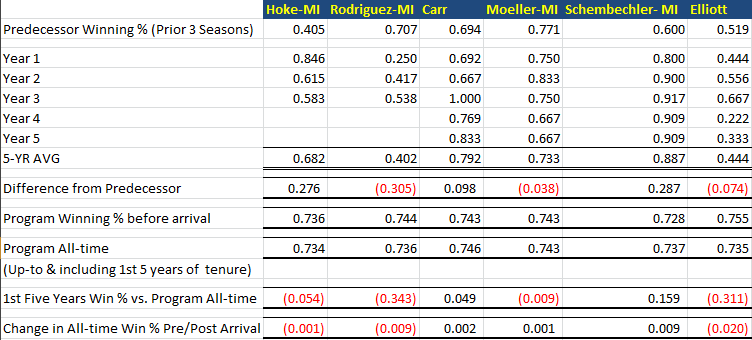

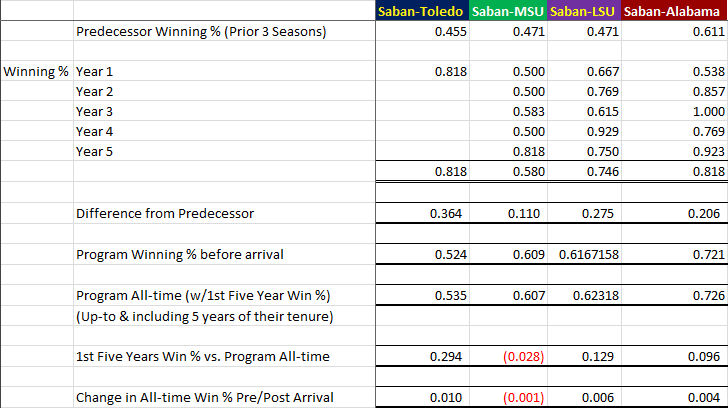
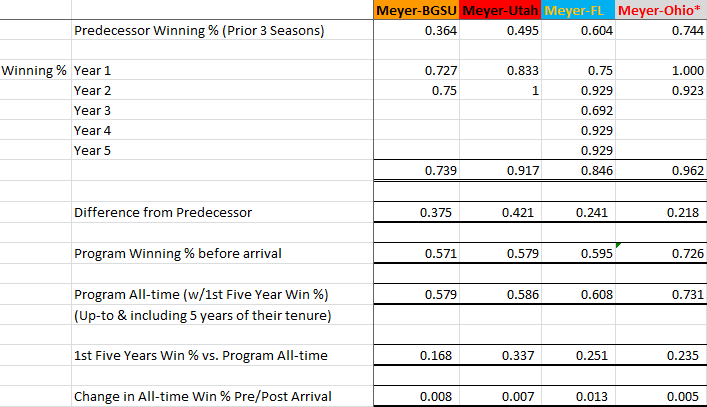
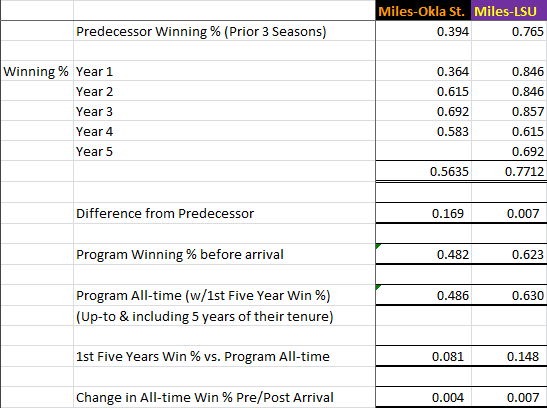

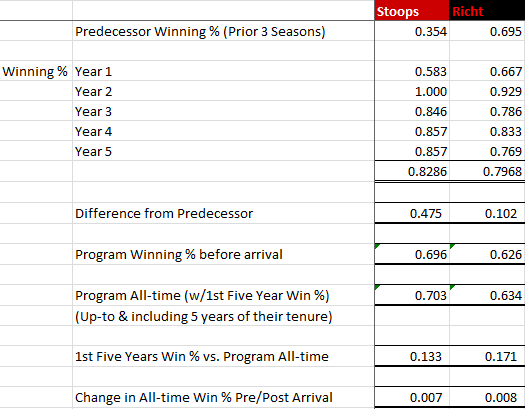
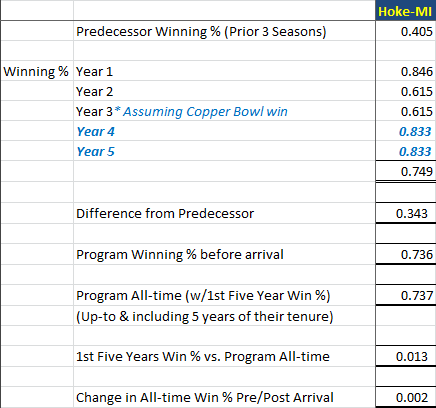
Comments